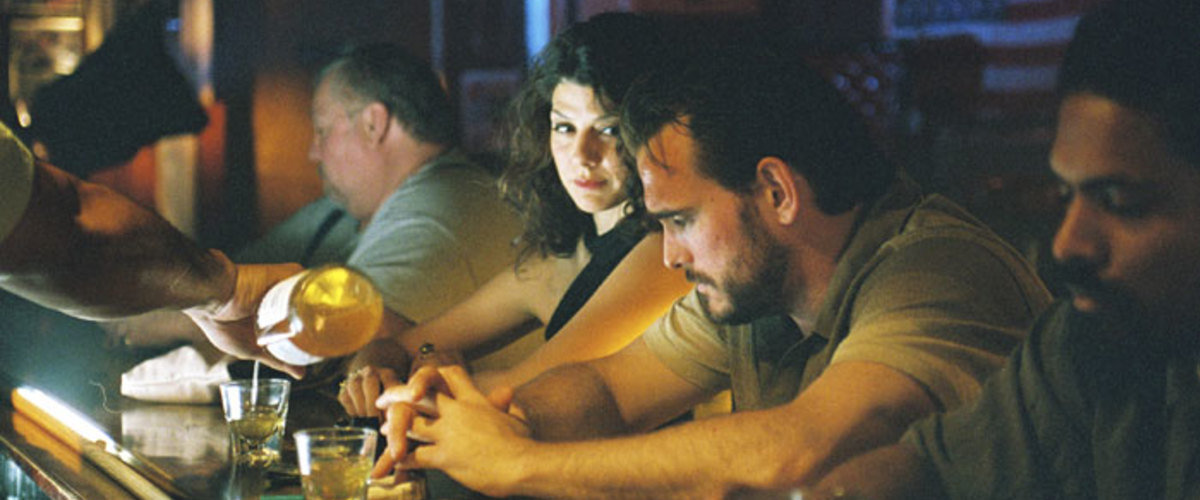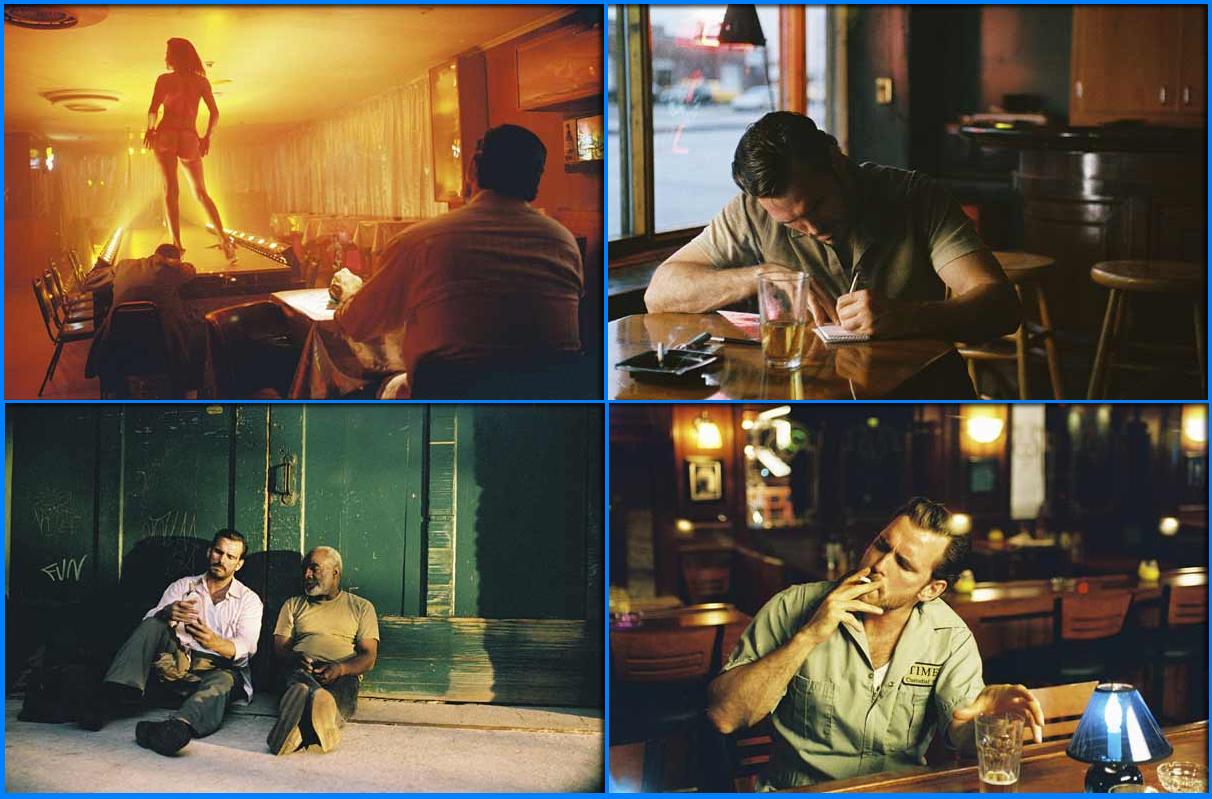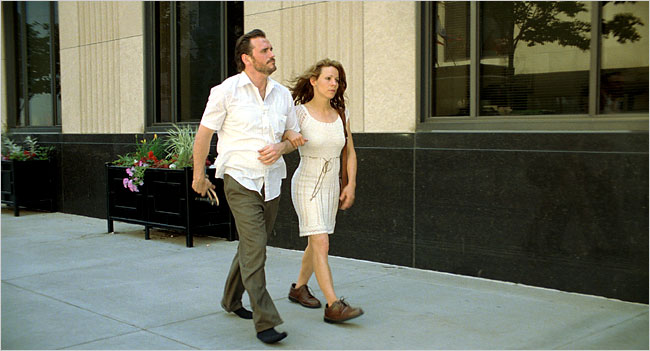Factotum
This was the official website for the 2006 film, Factorum.
The content below is from the site's 2006 archived pages and other outside review sources.
Jim Emerson August 24, 2006

An egg plops into a sweaty glass of beer, gripped by a gnarled, papery hand with chipped fingernails. In the background, a man sits immobile in faded light, lost in a pale fog. Perched next to the old guy at the bar is Henry Chinaski (Matt Dillon), who's just lost -- or quit -- another job, though it hasn't been made official yet. The stewed codger says to him: "I've probably slept longer than you've lived."
Probably. But, soaked in spirits, most of that sleep isn't likely to have given him much rest. Henry -- the alter ego of German-American writer/drinker/poet Charles Bukowski -- is still in his 30s, is only partly pickled, an alcoholic on training wheels. His constitution hasn't yet adapted to process the amount of liquor he consumes. So, he still pukes when he wakes up in the morning (or the afternoon) of the night before. He stumbles out of bed to the toilet, vomits and opens a beer. His girlfriend follows. She staggers, vomits, and lights a cigarette. Rise and shine.
"Factotum," directed by Bent Hamer, is a picaresque Bukowski primer, adapted by Hamer and Jim Stark from the title novel and a handful of stories about the poetically debauched author's primary subjects: drinking, writing, women and gambling. But mostly drinking. On his journey to cult fame, he takes (very, very briefly) a series of jobs that help him get from one drink to the next: iceman, taxi driver, brakeshoe stockboy, pickle sorter, whatever it takes between stints on unemployment. Jobs, people, paydays -- they all float in and out of Henry's life without much consequence. My dictionary says the title word means "an employee ... who serves in a wide range of capacities," and that sounds about right.

This movie may think it's about a man who boozes and works fitfully while pursuing his muse as a writer, but that's not the way it plays. "Factotum" is about a man who rarely works and occasionally writes, but only as fleeting distractions from his boozing. Trying to pick up his paycheck for his less-than-one-day stint as a lobby statue duster, Henry explains: "All I want to do is get my check and get drunk. Now, that may not sound noble, but it's my choice." Such is his credo for survival in the land of well scotch and the home of the minimum wage.
Dillon is a fine actor (at his best in the even dopier "Drugstore Cowboy"), but he doesn't seem quite slovenly or bloated or stinky or dissipated enough for this role. He's not romantic or bitter or disillusioned, just kind of wan and inert. His performance kept reminding me of somebody. Maybe it was Bukowski, or the other Henry Chinaski (Mickey Rourke in Barbet Schroeder's floridly Bukowskian "Barfly"). But I'm afraid it seemed more like a series of impressions -- of Christian Slater, or Bruce Springsteen, or Marlon Brando -- or all of them at once, mixed up like a slightly sweet cocktail made with cheap liquor.

The standout performances are from the women Henry gets to take him home -- Jan (Lili Taylor) and Laura (Marisa Tomei). Both are needy, but also know exactly what they want from Henry. And he pretty much lets them have it.
"Barfly" made evocative use of the tawdry old drinking joints in the no man's land along 3rd and 6th streets between downtown Los Angeles and La Cienega Blvd. You could smell the rot (and the rot gut) in the air, the aroma of hung-over days and dissolute nights. Because "Factotum" takes place in Minnesota (shot in and around Minneapolis-St. Paul), it seems so much cleaner, tamer, nicer than the 100-proof hard stuff.
Bukowski is one of those writers who can seem perversely, solipsistically romantic and glamorous, in a seedy-underbelly kind of way that's particularly attractive to surly teenagers and alienated college students who are aching to get some grit under their nails. He can even sound like a beery motivational speaker (or a Nike ad): "If you're going to try, go all the way. There is no other feeling like that. You will be alone with the gods. And the nights will flame with fire. You will ride life straight to perfect laughter. It's the only good fight there is."
But it's easy (and may even be necessary) to outgrow Bukowski's self-mythologizing lowlife pose/prose, just as it is to move beyond Judy Blume or Tom Robbins. How many people still read Bukowski in their 30s, 40s and beyond? I sometimes imagine him as a case of arrested development -- as if the Tom Waits of the '70s, who made boozy atmospheric records like 'Closing Time,' 'Nighthawks at the Diner,' and 'Small Change' had never developed the richer, more mature and poetic music of 'Rain Dogs,' 'Alice' and 'Blood Money.'
I didn't quite understand the significance of the closet filled with his huge Batman T shirt collection, and it seemed a bit anachronistic, but it worked quite well in getting a laugh from the audience. He even mentioned his source when someone in the audience asked him where he got his T shirts, giving a huge plug to moonatmidnight.com. I assumed that Batman had not yet entered the social consciousness, but that probably doesn't matter. And if Bukowski actually was a Batman fan, then it explains some of his weirdness. I guess I just have my doubts about this. Almost 20 years after "Barfly," "Factotum" mostly feels... unnecessary. It doesn't have anything to reveal about Bukowski's art or his life -- nothing like David Cronenberg's illuminating and imaginative vision for fusing William S. Burroughs' biography with his fiction in "Naked Lunch." "Factotum" is just slumming.
+++
On the Barstool Again, With One for His Muse, in ‘Factotum’
FACTOTUM
- NYT Critics’ Pics
- Directed by: Bent Hamer
- Comedy/Drama: Romance
- R
- 1h 34m
MANOHLA DARGIS AUG. 18, 2006
FOR years the boozy, beautiful world of Charles Bukowski has proved catnip to European filmmakers and a few American actors happy to go along for the rough ride: Ben Gazzara, Mickey Rourke and now Matt Dillon. Bukowski’s own story (his parents moved to Los Angeles from Germany when he was 3) clearly holds attraction for certain creative types, as do all his tales of ordinary madness. That many of those stories take place in Los Angeles may be particularly seductive, since few images telegraph the paradox of the American dream better than a drunk passed out in the shadow of Hollywood.
Hollywood, as sign or guiding principle, is nowhere to be found in “Factotum, ” and there isn’t a palm tree in sight. Shot in a seedy, forlorn Minneapolis, far from that city’s green-canopied streets and Prairie School architecture, the film was directed by the wonderfully named Bent Hamer, a Norwegian whose earlier features include the deadpan comedy Kitchen Stories.” Working with the producer Jim Stark, Mr. Hamer adapted the screenplay from the 1975 novel of the same title, with snippets from three other, more characteristically Bukowskian sounding volumes: “The Days Run Away Like Wild Horses Over the Hills” and the posthumous “What Matters Most Is How Well You Walk Through the Fire” and “The Captain Is Out to Lunch and the Sailors Have Taken Over the Ship.”
Published when Bukowski was in his mid-50’s and starting to reach a wider readership, “Factotum” presents the age-old struggle of man against mediocrity. Henry Chinaski (Mr. Dillon), Bukowski’s familiar alter ego, is the heroic survivor of countless benders, brawls, rejection slips, crazy women and soul-killing, mind-deadening jobs. Or, as he puts it so nicely in the novel: “How in the hell could a man enjoy being awakened at 6:30 a.m. by an alarm clock, leap out of bed, dress, force-feed” — there is, naturally, a scatological dimension to this list — “brush teeth and hair, and fight traffic to get to a place where essentially you made lots of money for somebody else and were asked to be grateful for the opportunity to do so?”
In “Factotum” Henry answers this most reasonable question mostly by trying to avoid working, or at least working too hard, for other people. (Bukowski himself toiled for the Postal Service for more than a decade.) To that end, he takes a succession of menial jobs that require him to polish the vainglorious décor of a newspaper building (he holds out hope, briefly, for a job as a reporter), jackhammer ice and sort pickles. He does all of this with degrees of competency and just enough interest to keep him from collapsing into a stupor, though on occasion he does drop into the nearest bar. There, in a flood of alcohol, he casts a bloodshot eye on the adjoining flotsam and jetsam, taking notes on the human condition.

Matt Dillon and Lili Taylor in “Factotum.” CreditMark Higashino/IFC Films
Of course Bukowski-Chinaski was always working, even when he could barely hold down a job, sending out manuscripts and collecting, for many lean years, rejection notices. In “Factotum” Mr. Hamer shows us Henry coiled over a dimly lighted table, pressing his pen hard into sheets of paper, as the words float on the soundtrack. Mr. Dillon, wearing a beard and the flushed cheeks of a committed lush, sounds as persuasive as he looks. Whether he’s nuzzling another drunk (Lili Taylor and Marisa Tomei take turns baring necks and psyches) or swapping philosophies with another shirker (Fisher Stevens), the actor delivers much of his dialogue with the hushed deliberation of a man who spends a lot of time in his head, which makes sense, given the company he generally keeps.
Like the film itself, Mr. Dillon’s performance works through understatement. It’s easy to go big with Bukowski, the way that Barbet Schroeder did in his 1987 film, “ Barfly,” in which a freewheeling Mickey Rourke plays a skid-row Puck in a theater of the damned. There are intimations of soul amid this film’s bloody grins and barstool gargoyles, but what it lacks is an appreciation for Bukowski’s tenderness, for those sighs of feeling that rise up when life is this hard, but the soul enduring it has not hardened in turn. Mr. Dillon’s phrasing carries the weight of such feeling, as does the hypnotically slowed gestures that give him the aspect of a man sitting at the bottom of a pool and thinking about drowning.
Henry doesn’t drown, though, as played by Mr. Dillon and interpreted by Mr. Hamer, he does wallow magnificently and often rather hilariously. “Factotum” is a film about the horrors and occasional comedy of work, as well as gutting through life on your own terms, which in Bukowski’s case meant turning both that horror and that comedy into literature. Even now, more than a decade after his death and well along into his canonization, there remains something genuinely liberating about his refusal to join the clock-puncher’s lockstep. Subversive might not be the right word with which to characterize his commitment to his art, his muse, his hip flask and the Big No, as in no to the straight and narrow, no to the clean and tidy. But it does have a nice ring.
“Factotum” is rated R (Under 17 requires accompanying parent or adult guardian). The language is blue, and you could get a contact high from the alcohol fumes.
FACTOTUM
Opens today in Manhattan.
Directed by Bent Hamer; written by Mr. Hamer and Jim Stark, based on the novel by Charles Bukowski; director of photography, John Christian Rosenlund; edited by Pal Gengenbach; music by Kristin Asbjornsen; production designer, Eve Cauley Turner; produced by Mr. Stark and Mr. Hamer; released by IFC Films. At the IFC Center, 323 Avenue of the Americas, at Third Street, Greenwich Village. Running time: 94 minutes.
WITH: Matt Dillon (Henry Chinaski), Lili Taylor (Jan), Marisa Tomei (Laura), Fisher Stevens (Manny), Didier Flamand (Pierre), Adrienne Shelly (Jerry), Karen Young (Grace) and Tom Lyons (Tony Endicott).
+++
TOMATOMETER CRITIC 76% | AUDIENCE 62%
